#steve and john just do a carbon copy of the original
Text
Talking with Glen Matlock
It’s not too often that I get to interview a rock legend. I don’t use that term loosely but it certainly applies to Mr. Glen Matlock. The English rocker began as the bassist in the original Sex Pistols. He co-wrote 10 of the 12 songs on Never Mind the Bullocks Here’s the Sex Pistols but parted ways during the recording process. He did play on some of the songs though. But he re-joined for all of their reunion tours. He has also played with countless others, including Iggy Pop, The Damned, Primal Scream, the reunited Faces and Blondie. He is back with a new album with his band Glen Matlock and the Philistines, the recently released Consequences Coming. I recently caught up with him via Zoom.
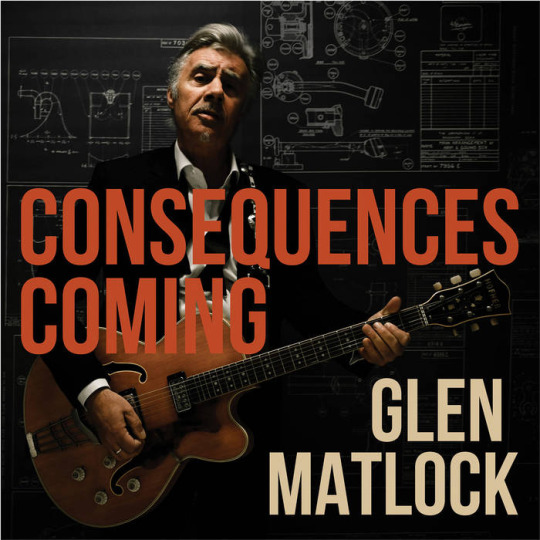
Consequences Coming album cover
Me: For those that are unaware, you were in the Sex Pistols and recorded with them before parting ways and then you re-joined for all of the reunions. What is your relationship like with them today?
GM: At arm's length. A little bit frosty with some of them, not to mention names. But I’m probably going to go have dinner with Steve [Jones] on Monday, and with Paul [Cook], who lives in London.
Me: I read a few years ago around 2019 that you said in the press that there could be a reunion coming up soon. Not sure if you’re at liberty to say, but could that still be happening soon?
GM: No, I think that’s kinda been and gone a bit now. You know, maybe that might’ve happened then. But all of us, we’re all pretty busy guys with different bits and pieces. There’s not really time, to be honest, or the inclination. Sometimes you think “yeah, the time is right”, but if the time was right it might’ve been a couple years ago now. You know, there’s a time and a place, and we had ours. That’s it really. There’s some good stuff there!
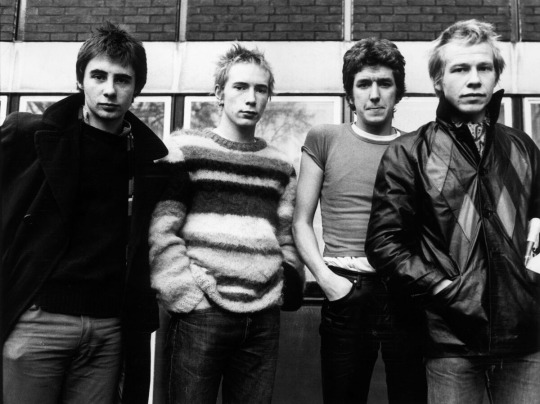
Matlock on left in 1976 with Sex Pistols Johnny Rotten (John Lydon), Steve Jones and Paul Cook
Me: In 2013, I attended the Europunk exhibit at Cite de la Musique in Paris. I do not speak French, but I was able to understand everything about the exhibit: the TV clips, the album covers, the music, the memorabilia, etc. As someone who has performed all over the world, do you feel that the energy of punk is something that transcends languages and can create a common bond in a way?
GM: Yeah, definitely. I think punk is a very broad term. There’s a long way from The Ramones to the Buzzcocks, from Richard Hell and the Voivoids to The Slits to the bands that come along now under the punk umbrella. But I think it’s a by-word for people and things that read between the lines a bit more and will not be talked down to by their supposed superiors. So to be associated with that is kinda cool. I don’t really subscribe to the idea that to be a punk you have to have a mohawk. I mean it’s become kind of a carbon copy look for some of these also-ran bands. It’s kind of all they got really. To me, the punks were all really more forward-looking. I mean you can say that about lots of artistic kind of music. I mean there was a big broad church of different people doing different things back then. I don’t think punk is any different in that respect, it’s just what I got saddled with.
But yeah, you being able to get that in another country and in another language, it was always pretty clear what it was about. It had all aspects covered: the music, the look, the typography, the art work - it all came together in one big thing and the total was bigger than the sum of their parts, which is all good.
Me: Looking at your history, you have performed with artists like Iggy Pop, The Damned, Blondie, and you’ve performed with members of The Clash, New York Dolls, Siouxsie and the Banshees and Generation X. You are seriously the 6-degrees-of for punk rock history!
GM: Maybe, but I don’t think I’m the only one like that. I think doing what I did do with the Pistols and coming through on that. People said it was a seachange - I don’t believe that. I think music is like a baton race. There’s people who came before you, they do their thing, then they pass the baton onto you, then you pass the baton onto the people after you. I’ve managed to straddle bands that came before what we did, like you mentioned Iggy and I also did some stuff with my all-time favorite band The Faces. And then I’ve done some bits and pieces with bands like Primal Scream [Matlock played on their 1997 album Vanishing Point and he played bass for them in 2011] and Zak Starkey [Matlock played in Starkey’s supergroup The Silver Machine], who came along after that. I get asked to do these things because I play bass pretty well. I enjoy that, but what I really do and have continued to do is I continue to write songs. I write and before long you have all these songs going around in your head and you can’t think straight so you need some kind of outlet for it, which normally means making an album. That’s what I’ve done now again. I think I’ve made some pretty good albums. I’m quite pleased with this one. [pause] Yeah, beauty is always in the eye of the beholder.

Matlock in 2023
Me: Let’s talk about the new album Consequences Coming. How did this particular album come about?
GM: Well, I started writing around the time - you probably heard we had this ridiculous thing in Britain called Brexit, and how Brexit has enabled the powers who put it forward as kind of a smokescreen. It only serves the dreams of the right-wing elite. It kind of encapsulates this whole crazy move to the right in the Western world. I think ultimately it was terrible and people are starting to see through it. It is slow, but in England there is a light at the end of the tunnel. The gestation period for that is also when I began writing songs. You can’t not be aware of what’s going on around you and reflect upon it somehow. So the songs on the album came out of the that. The first single that came out at the start of the year “Head on a Stick” is quite something I’d like to see people held to account. The album is called Consequences Coming. People wanted to get this out last year and it didn’t quite work out. I’m an older guy and record companies are looking for the new...who’s the singer? Not Shania Twain, but a young girl?
Me: Taylor Swift?
GM: Yeah, I’m not Taylor Swift, so you know, they’re not falling all over themselves to help me get a record out. But I find I was a bit worried I missed the boat. But I was in New York last weekend and I had to go up to Rockefeller Plaza to do some press for the new album on Sirius XM radio and I struggled to get a taxi cab uptown from the Bowery because what was coming downtown from Trump Tower to the big courthouse was Donald Trump to be arraigned. And I’m going to talk about my Consequences Coming record and I said “A ha! Maybe I haven’t missed the boat afterall”!
I’ve always been a big fan of people like Pete Seeger, who wrote “If I had a Hammer / I’d hammer out a warning”. Some of us saw what was coming and we tried to sound the fire alarm several years ago.
Me: It’s interesting you talking about being critical of Brexit and Trump because going back to the beginning of your career, there was a political element to the Sex Pistols. Do you feel that punk music can still be a force for positive change?
GM: [Pauses] Well, we can all holler and shout and scream, but all we can really do is - there’s a guy you might’ve seen him on the TV, a guy named Steve Bray, who is in Parliament Square every day, yelling every day at politicians especially the right wing ones going into Parliament. He’s a bit of a joke, but he’s also like a mosquito, smacking away at them all the time. The more people who do that, a pressure builds up and hopefully it gets to the stage of saturation. That’s all I can kind of do. I enjoy going on a march. In fact a few years ago there was one of the better marches, the Brexit Is Dopey March. I run into Kevin Rowland of Dexy’s Midnight Runners, who is a friend of mine, and just behind us there’s a guy with a little tricycle and a little trailer on the back of it with a massive ghetto blaster on it and he was playing “Let’s Stick Together” by Bryan Ferry as we’re marching to Parliament. I’m thinking what a great place to have this song played. That was the seeds of “Consequences Coming” and “Head on a Stick” as we were marching to Parliament. So all of these little things kind of add up. But there’s the political side to it too. I’m not a Communist, I’m just some guy trying to speak truth to power. But there’s also the musical side to it and I think there’s some really good tunes.
Me: I got to listen to an advance of the new album. Really great album, I’m not just saying that. I kind of noticed a little Texas blues influence on the album a little bit. Was that something you had been listening to prior to the recording?
GM: Not particularly, but music it kind of seeps in to all the places you least expect it. You know? I mean the music might be a bit bluesy, but it could also be something off of Exile on Main Street or Goats Head Soup. I don’t mind showing that, I like that, it’s good.

Christian Lees as Glen Matlock in 2022′s Pistol
Me: Last year Danny Boyle gave the Sex Pistols the TV mini-series treatment with Pistol. You were portrayed by Christian Lees. What did you think of the series?
GM: I was disappointed, I thought it could’ve been really good. I liked Christian Lees and thought he was the right guy, but I thought the script let it down a little bit. I gave them the chance to run with it, but I didn’t think it was good. But on the other hand I thought it was important, because it is Steve Jones’s story and Steve is the guy who started the band. If he wasn’t allowed to tell his story, that would be morally wrong. But it wasn’t as good as it could’ve been. I felt a little bit ignored by Danny because I had quite a few conversations with him ahead of it. But be assured, Danny Boyle knows, under no uncertain terms, what I think about it.
Me: You had a show in April in L.A. with Gilby Clarke (formerly of Guns N’ Roses), Clem Burke of Blondie, Kathy Valentine of The Go-Go’s and Fred Armisen. Talk about a meeting of the minds!
GM: Yeah, I’m kinda glad those guys want to be associated with me and play a show with me. I’ve been friends with Clem for a long time. He’s the one who asked me to help out on the last Blondie tour when they were stuck because their previous bass player couldn’t do it. Leigh Foxx [Blondie’s studio bassist]was a very good bass player and a good guy. So I’m honored to be asked to do that, but I’ve worked with Clem on many a projects. Some good, some kinda bad, right? But we play well with each other. Steve Fishman is a friend of theirs on bass. And we were short a guitar player, so Clem suggested Gilby. I had met him briefly a couple of times, but he’s great.
Me: Any chance there might be a U.S. tour after this L.A. show and U.K. dates?
GM: If it goes well, yeah, I’d love to play in America. I just like playing. The whole world is my oyster as I see it. I hate to be constrained, I’ve made some great relationships with friends all over and I’d like to be able to continue that. Fingers crossed - I’d love to do that.
For info on Glen Matlock’s Consequences Coming: https://glenmatlock.lnk.to/newalbum
#glen matlock#interview#sex pistols#punk rock#iggy pop#the faces#primal scream#zak starkey#dexys midnight runners#pistol#danny boyle#christian lees#steve jones#paul cook#john lydon#gilby clarke#clem burke#blondie#music nerd
1 note
·
View note
Text
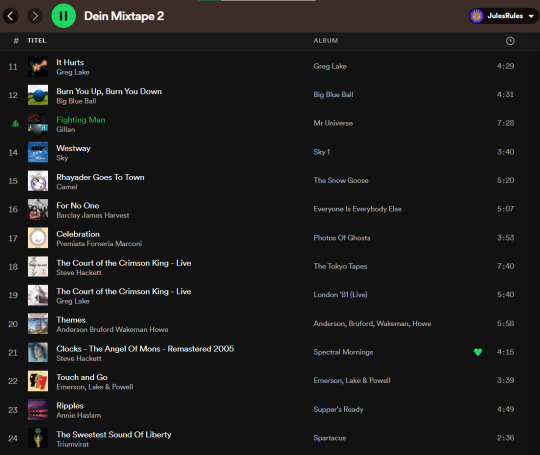
Now this is what differentiates Spotify's AI from a human DJ... imagine putting that together intentionally as a playlist. Lol. But it's kinda interesting!
#prog#prog rock#progressive rock#steve's version is sung by#john wetton#who was one of the successors of#greg lake#king crimson#while greg's version has on guitar#gary moore#really interesting combinations of artists#greg's voice sounds more right to me#and gary's guitar adds an edge#but i don't care for greg's alternate vocal melody on the chorus#it's still the more interesting rendition#steve and john just do a carbon copy of the original#but i guess it's ok#since they also had#ian mcdonald#on stage#music#rock music#classic rock#live music
3 notes
·
View notes
Text
The Mosley Review: DC League of Super-Pets
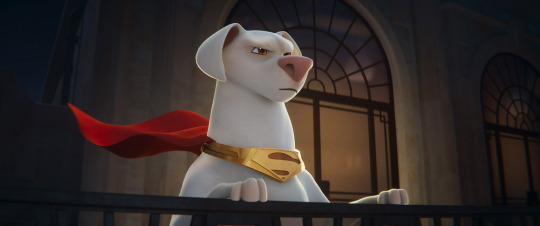
I have asked this question so many times over the years and I'm sure I'm not the only one. Why are DC's animated films and tv shows so much better than their live action films?! There are some amazing gems in the DCEU and films not connected to them like The Batman, but consistently the DC Animated Universe and other ventures like The Lego Batman Movie have been knocking it out of the park. I just don't understand it. What I do understand is that the animated films take big swings on characters that aren't as highlighted or forgotten and they've given them new life. That's what has happened here and I was truly blown away by how much love was poured into this story. Sure it could've been a mindless fluff film for children, but instead it carries that perfect balance between child humor and adult humor that kept it engaging. I grew up with the knowledge of Superman's dog Krypto and I remember the comics and animated specials. This was a delightful reimagining of his origin and I loved every bit of the Easter eggs of the DC universe spread across the film.
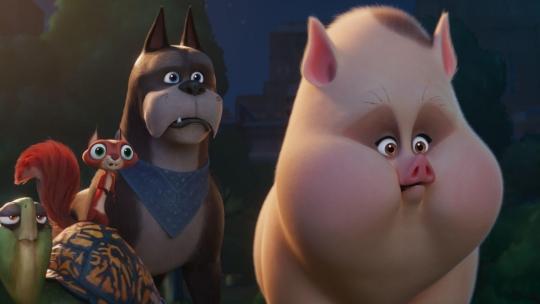
Dwayne Johnson was fun and light hearted as Krypto. He captured the loyal companion that is almost a carbon copy of his owner. John Krasinski was excellent as Superman and he nailed the boy scout nature of the character. The two of them together were wonderful and I loved their adorable scenes together. Kevin Hart was so good as Ace and I loved that he was more level headed. He had some hilarious moments in the film, but his backstory was where the heart of the film really comes out as it is truly heartbreaking. Vanessa Bayer was cute and bubbly as PB and I liked her moments of self discovery and confidence. Diego Luna was a lunatic in the best way as Chip. He was all over the place and fun as he tries to control his powers. Natasha Lyonne was perfect as Merton McSnurtle. I loved her geriatric one liners and well placed curses. She nearly stole every scene in the film. Keanu Reeves was perfect as Batman and every time he spoke, it was gold. Marc Maron was truly having fun being evil as the iconic villain Lex Luthor and I was totally there for it. Kate McKinnon was excellent, perfectly sarcastic and sometimes sadistic as Lulu. This entire cast had excellent chemistry and that is rare in voice acting in massive animated films like these.
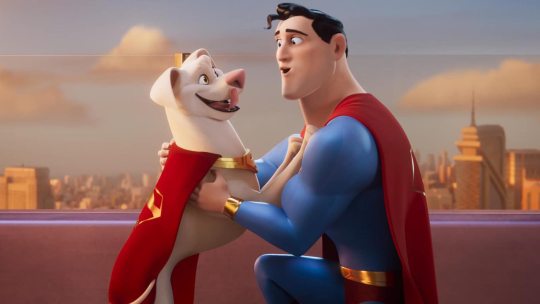
The score by Steve Jablonsky was great and of course sprinkles the iconic John Williams and Danny Elfman themes for Superman and Batman. The animation was smooth and I loved how epic some of the shots were during the action scenes and even some of the gorgeous views of Metropolis. This was truly a fun superhero film about the super pets that I didn't know I actually needed. Now if only DC could transfer this amount of good storytelling to their DCEU films. Do stick around for both fun end credit scenes. Let me know what you thought of the film or my review in the comments below. Thanks for reading!
#dc league of super-pets#dwayne johnson#kevin hart#John Krasinski#Olivia Wilde#kate mckinnon#marc maron#vanessa bayer#natasha lyonne#diego luna#keanu reeves#DC comics
29 notes
·
View notes
Text
Why “The Last Jedi” Is The Best “Star Wars” Flick Since “Return of the Jedi” (Spoiler free review)
It’s still up for debate whether a yearly “Star Wars” is a good or bad idea. Based on “The Last Jedi”, it’s a great idea. Director/writer Rian Johnson has mixed in a solid amount of originality to avoid the “been there-done that” feel of “The Force Awakens”, but also enough nostalgia to keep the fanboys happy. However, it does seem like a movie that may not age well as there are a few moments that aren’t going to make much sense after repeat viewings.
There’s no doubt that Johnson wanted to start with a banger and he opens with a huge space battle between General Leia’s (Carrie Fisher) Rebels and the First Order. It firmly establishes Poe Dameron (Oscar Isaac) as the space Maverick with the cute robot BB-8 as his Goose sans bromance. Unfortunately, the opening sequence is a bit of a dud and is the first of many decisions that Poe makes that turn out to be, well, fairly pointless.
The First Order-Rebels space chase is one of three main threads. Another picks up where “The Force Awakens” left off with Rey (Daisy Ridley) crashing Jedi Island to enlist Luke Skywalker (Mark Hamill) back into the fight against his former apprentice, Kylo Ren (Adam Driver). There’s a lot of “Luke and Yoda in Degobah” happening here with one scene in particular almost a mirror image of another from “The Empire Strikes Back.”
The final thread involves finding a code breaker so former Stormtrooper Finn (John Boyega) can sneak onto the First Order’s main Star Destroyer and disable their tracking system. With the help of another Rebel, Rose (Kelly Marie Tran), he travels to a zany pleasure planet where the rich and powerful spend their time in casinos while gambling on races involving what appears to be a horse-llama hybrid animal with a human face.
The first 90 minutes of “The Last Jedi” contains a lot of filler that seems created only to allow each character to have something cool to do. There are times when characters with solid backgrounds betray what has firmly been established in past movies and many times, it’s done only for humor purposes. All three of them eventually meet and then “The Last Jedi” really hits its stride.
Even with about half a dozen moments that seem like the movie is ending, the final hour of “The Last Jedi” is cooking with gas. The action is a blast and perfectly filmed, the characters look and sound great (even with one truly eye-roller of a line), and the plot twists simply must go unspoiled. Director Johnson and cinematographer Steve Yedlin have put together scene after scene with only one goal in mind: make these characters look cool. There is an exceedingly epic moment with Luke Skywalker that could inspire people to be unable to sit still. It’s that fantastic.
The actors are doing better than anyone in the Lucas prequels, but that’s a very low bar to clear. Arguably the most accomplished and skilled actor in the movie, Oscar Isaac, is once again a one-dimensional character with little to do. John Boyega is good, but it’s more of the same for his portrayal of Finn. Domhnall Gleeson’s evil General Hux is so completely over the top and ridiculous that it’s borderline irritating.
Carrie Fisher and Mark Hamill carry a load of emotional heft in “The Last Jedi”, almost just based on who they are. They are both quite good and they each get some hair-raising, tear-jerking moments that are sure to be included in the “Star Wars Greatest Hits” clip.
“The Last Jedi” belongs to Daisy Ridley and Adam Driver and rightfully so. Not only are their roles written in spectacular fashion, the actors hit all the right notes and the movie almost drags when it’s not focused on them. They have the most to work with and the tension between them is captivating.
It’s a shame that Rian Johnson isn’t going to be behind the camera for the next “Star Wars” installment. “The Last Jedi” is easily the best in this entire franchise since “Return of the Jedi” and it would have been interesting to see how he would have concluded this trilogy. In the meantime, we can just enjoy a very good “Star Wars” movie that avoids being a complete carbon copy of what’s come before it.
#Star Wars#The Last Jedi#Review#Mark Hamill#Carrie Fisher#Daisy Ridley#John Boyega#Oscar Isaac#Adam Driver#Luke Skywalker#Leia#Rian Johnson
7 notes
·
View notes
Text
New Post has been published on Alienation
New Post has been published on https://alienation.biz/knowledge-economy-rule-number-one-only-smart-companies-win/
Knowledge Economy Rule Number One - Only Smart Companies Win
There were 3 economic paradigms in recent records. They began when there has been a spoil from matters made on a small scale. They started out when the matters made and offered by artists, craftsmen, masters, blacksmiths, wheelwrights, family farmers, traders of handmade items, and so forth. Have been changed by means of matters that had been mass produced and mass fed on.
The key factor is that mass manufacturing is the cornerstone of all current financial paradigms.
First, it became meals that became mass produced. So the first financial paradigm turned into the Agricultural Revolution.
For the first time in records, many people had sufficient to consume. They stopped stressful about meals, did now not farm their personal crops nor improve and slaughter their own farm animals. The mass manufacturing of meals marks a turning point in records. It gave humans some thing they by no means had as hunter-gatherers: free time. The capability to transport approximately and tour, even live in new places. Leave the farms and are available to what were becoming the first cities.
Owning land became the key to wealth, since land used to develop food become the key to the Agricultural Economy. Land Barons have been born. The landed gentry turned into created. Kings gave land as the highest boon for offerings rendered. Kings were kings because they owned all the land that’s why they might supply some of it away. Private belongings was born. My land become fenced off out of your land. New nations unfolded big tracts of land because they knew that making that land efficient turned into the key to prosperity. We controlled muscle tissue because farming was a hard, again-breaking activity, even for the oxen and horses.
Next came the Industrial Economy. I agree with it commenced with the printing press inside the mid-fifteenth century. I additionally accept as true with it created a length of transition that has came about with every new monetary paradigm.
The Incunabula
The incunabula was a length in which the church nonetheless managed the written phrase and, until the printing press became invented, ‘books’ had been in constrained supply. The concept of imparting the loads with ideas became heretical. So the church decided that it’d use the printing press for God’s work and take the illuminated manuscripts from the Scriptoriums inside the monasteries, wherein all bibles were created and print out the phrases and send these first ‘paperwork’ again to the Scriptoriums for illumination. So the clergymen took the paperwork and delivered colorful pix of devils and angels, ivy and floral scroll work, visual ‘job aids’ for studying approximately right and wrong and what took place to you in case your strayed from the course of righteousness.
The pics had been crucial because most people alive then could not study. These first printing press books are known as incunabula. They represent a paradigm shift that in the end effected the whole lot – your work, your play, your circle of relatives, your mind, your lifestyles.
Once the Industrial Economy simply commenced to steam ahead, once more it changed into all about mass production, best this time it became the mass manufacturing of factors. We managed hands.
The first matters to grow to be ‘industrialized’ have been farming tools – cotton gin, land tillers, tractors, and more. Other things started to become mass produced as properly. Cars. Trains. Ships. Stuff human beings wished and purchased out of the Sears catalog. Typewriters, a private printing press when you introduced carbon copies (the origin of cc). And so much extra stuff that we now not simplest have become consumers of meals however clients in popular.
The capitalist global changed into all approximately transferring capital round to similarly the production of factors (which include the industrialized production of food) as a way to create wealth. The wealth of countries, as recorded through
Adam Smith, become built upon a way of life and political machine that supported mass manufacturing and mass intake of factors.
Owning the manner of manufacturing was the important thing to wealth. The excellent wealthy dynasties of the industrialized international had been created at this factor in time. If you observe America, you spot people with names like Ford, Dupont, Getty, Rockefeller, Kennedy without end proudly owning the method of production and turning into the industrialist kings of this era.
It additionally intended we needed to make sure the lifestyle of mass consumers changed into healthful and working. According to John Taylor Gatto, public colleges had been created for this very motive. We did no longer want a critically thinking, independent populace centered on some thing aside from acquiring things. Work to spend. Spend extra and work tougher. Make the wealthy richer while you enrich your life with things. Towards the cease of this monetary paradigm, we invented the credit score card, one of the finest boons to mass intake conceivable.
Since we had, within the international locations that had embraced and were in the lead in these economic paradigms, all the food we ought to want (can you spell obesity?) and all the matters we ever was hoping for, we have been ready to move on into the subsequent economic paradigm.
And the Knowledge Economy became born. Peter Drucker in the overdue twentieth century, changed into prescient sufficient to peer what became coming subsequent and named the those who labored on this new financial paradigm Knowledge Workers. What they mass produced turned into Knowledge. New ideas. Innovations. Know-how. They spent their days questioning, writing, communicating, meeting, disseminating, rethinking, learning, creating, innovating, designing, analyzing, taking note of the thoughts of others, sharing, participating. We are dealing with minds.
The Knowledge Economy is so new that I think we’re in that incunabula duration of changeover when we realize that there has been a sea exchange, and maximum of us are just now not positive what it’s far.
I say most folks. Not, for instance, Bill Gates. The mass production of software is knowledge work. The folks that make it aren’t generating meals or vehicles or toasters (until they may be flying across your PC and I expect you’re analyzing this on your PC). They write code. The meet and speak about functions and features. They assemble code. They debug code (or permit you to play with it and debug it for them). Bill Gates is the richest man (thus far) within the new Knowledge Economy because he either clever sufficient or knew in his gut that they key to wealth in this financial paradigm was the mass manufacturing of information and the equipment that enabled as many humans as possible to supply understanding for a residing.
Several years ago I gave a presentation to the once a year collecting of CIO’s at Boeing in Southern California. As the top CIO turned into leading me into the conference room she told me that the constructing itself has a thrilling history. Originally an orchard grove for oranges, the constructing turned into first used as a large production facility for the production of airplanes. When the call for planes turned into reduced, the building was divided into floors, places of work and booths and people spent their workdays in the front of computers generating, refining, defining, revising, discussing, ammunicating ideas. Ideas for new planes. Ideas for enhancing manufacturing of planes. Ideas approximately associated initiatives that had some thing to do with planes. One piece of land, three financial paradigms.
The point is all they did all day became produce ideas, work with ideas, think about ideas, write and speak about thoughts. There had been still a small organization of those who ultimately made the one’s thoughts into things – planes. But they had been followed by the people who had more thoughts about how to promote it, promote it, educate people to fly it and so on and so forth. So the Knowledge Economy is all about the mass production of thoughts. Success in the Knowledge Economy is the capability to sift thru all those ideas to give you those that can be produced and offered. Turning thoughts into money.
Now I wonder myself why is that this any different that the preceding Industrial Economy? Someone had the idea for the Ford. Someone had the concept for the mass manufacturing line. Someone even had the concept of the coloration picks of the Model T – black. Why were things and the mass manufacturing of factors the underpinning of the Industrial Economy? Because it most effective took some thoughts to make loads of factors. And as soon as we all had, inside the advanced and advancing industrialized international locations, all the things we wanted, thoughts became the currency of choice. Ideas for brand new approaches of doing things. Ideas about approaches to appoint new technologies which had been new thoughts of their own right. Ideas approximately how to ‘converge’ the things that were created due to the brand new ideas. Ideas about the way to exchange the old analog global into a digital international.
Here’s another instance of thoughts turning into wealth within the Knowledge Economy. Steve Jobs and iTunes. Technology modifications the entirety and virtual era change the whole lot faster. So someone(s) had the idea for the iPod and someone(s) else has the concept that tune purchasers virtually wanted to have the selection to best purchase the track they desired. This becomes an entirely new concept from the antique version. The old model, from the Industrial Economy, forced music clients to shop for the factor, the CD, with plenty of tunes they did now not want and just a few they really desired.
The new virtual model was one music at a time. No CD. Download it directly. Pay as you pass. Music on call for. A 1:1 relationship between the purchaser and the manufacturer. Only on a scale that was mass. So a whole industry turned into reshaped by an concept. It’s occurring to television, pictures, medicinal drug, and other industries which can be artifacts of the Industrial Economy.
So in case you need to be wealthy inside the Knowledge Economy you want a good way to produce top notch thoughts, or have humans operating for you who can produce superb thoughts. Then be able to lead them to actual services or products, or have people who let you make them into merchandise or supply them as services. Then market and promote them. And, according to Thomas L. Friedman, since the global is now flat and becoming flatter, and thoughts realize no barriers, want no passport, travel within the air without wings, and might simply pop into anyone brain anytime and anywhere, being capable of compete on this new Knowledge Economy isn’t always smooth. The brains of innovative human beings are the important thing on this new paradigm. And the brains that take what they believe and flip it into a few element or some provider (or some revel in as the Disney Imagineers do with Disneyland and Disneyworld) are the rich. They own the mass production of ideas.
0 notes